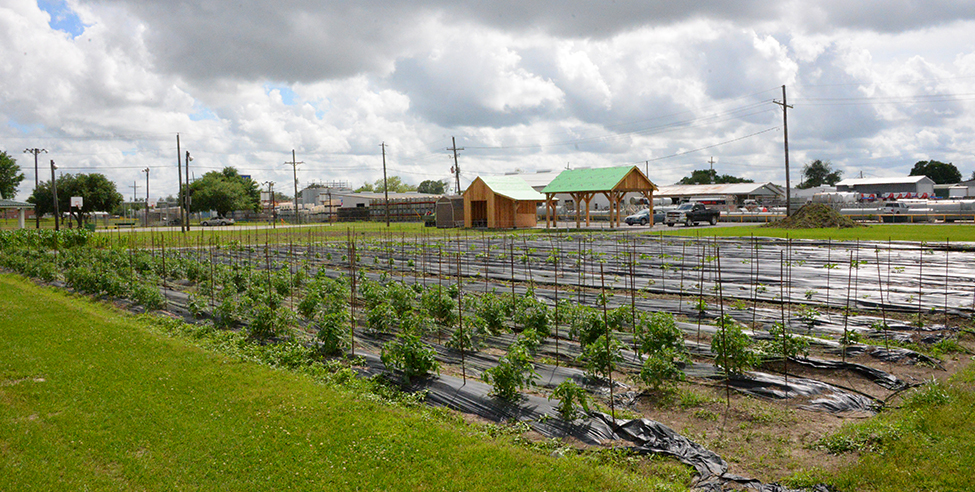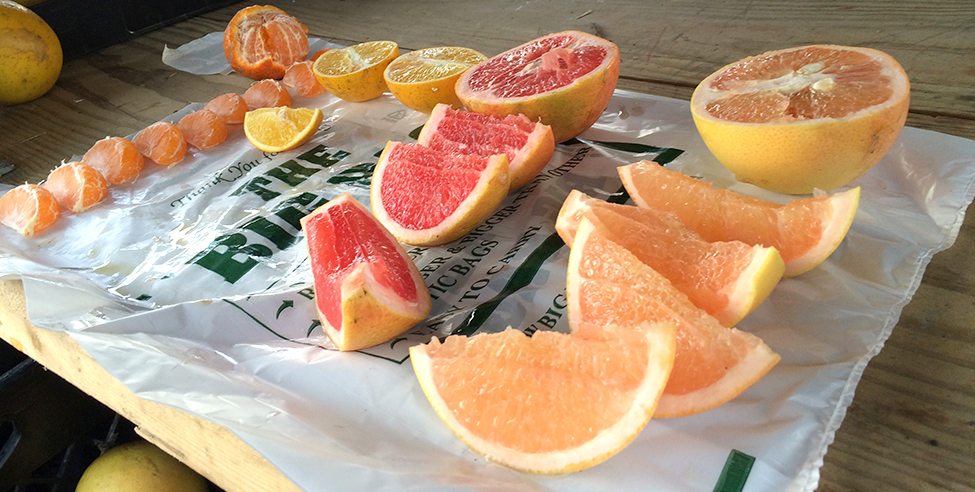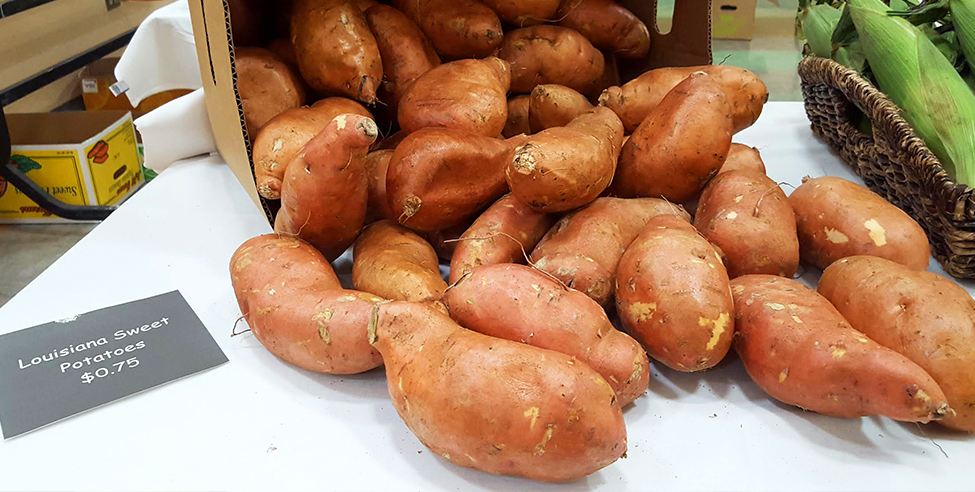St. Francis Vegetable Garden // Feeding the Community

by Claire LeBeouf, Staff Writer When Kimber Ratcliff, Chris Ledet and Nancy Bernard discussed the idea of opening a LOCAL GARDEN, they never expected that two months later they would break ground with the help of Catholic Charities and quickly become one of the most successful charitable organizations in the area. The original St. Francis Vegetable Garden, which is located behind the Thibodaux CivicCenter, has grown into the size of a football field that is home to fresh fruits and vegetables and lots of underlying meaning. The garden, which was started in memory of founder Chris Ledet’s father who was an avid gardener, now serves the community in more ways than one. It offers not only a place for volunteers to come together, but a place where food is grown with the purpose of helping those in need. All of the food grown in the garden goes directly to the local food bank as a way for the needy to receive healthy food choices. While most people think of a garden as a small patch of land in a backyard, Ratcliff sees it as an opportunity to build a sense of community. With the garden now expanding to different locations, Ratlciff, Ledet and Bernard are seeing their dream come to life. “When we started our organization, we wanted to make it possible for gardens like ours to be in parishes across the state. With the addition of the Southdown location in Houma, the food banks in Terrebonne Parish will have fresh produce to distribute at the food bank,” says Ratcliff. “Teachers in Terrebonne Parish now have a free living outdoor classroom to visit with their students.” The success of the garden is something that Ratcliff believes is not only a reward, but something that is very important to share with the younger generation of garden enthusiasts. “Watching children who visit the garden eat veggies they just picked, learning about where their food comes from, and healthy eating is rewarding,” says Ratcliff. “Not only are they learning about health and wellness they are learning to help those most in need in their community.” The garden’s mission to serve and build community has spread from Thibodaux to Houma. The garden’s produce is featured in the weekly Rienzi Market and gives people in the surrounding areas an opportunity to access fresh, local foods and support the ones who grew them. Also, with the garden branching out to locations in different schools, it is able to bring the teachers, parents and students together for a good cause. “Teachers and parents use the garden as place to teach lessons in science, nutrition and community giving,” says Ratcliff. “Children see up close how food grows and have the opportunity to pick vegetables, snack on them and take some home to share with their family.” The St. Francis Vegetable Garden serves many purposes and strengthens families, schools and communities. Working for the greater good of the Thibodaux and Houma areas, the garden proves that it is certainly special and one of a kind. https://youtu.be/SUTuPsU4fco
Rienzi Market // Connecting Food and Community

by Andetrie Vicks, Writer & Special Sections Rienzi Market is more than just a place to buy FRESH PRODUCE, it’s a place that gives back — the local bounty — to the COMMUNITY. “There is something special about going to the market and buying fresh food that has been grown by members of the community you live in,” says Kimber Ratcliff, the Rienzi Market coordinator. Located behind the Thibodaux Civic Center on Rienzi Drive Extension at the St. Francis Vegetable Garden, the market got its start in 2015 as part of the St. Francis Vegetable Garden’s mission to educate and give the community access to fresh, local foods. The market originally was open for eight weeks in the spring and fall at peak growing seasons, but vendors and the community wanted more. And as of this spring, the market is now open year round from 3:30 p.m. to 6 p.m. on Thursdays, making it convenient for the public to shop for items after work and/or school. Depending on the growing season, the market features citrus, eggs, mushrooms, sprouts, carrots, lettuce, shallots, kale, Swiss chard, honey, chicken, crabs, vegetable plants (for the planter working on their own garden), jams, jellies, pickles, all grown and produced by the farmers themselves. Coming in a few weeks are fresh caught, local crawfish, crabs and shrimp. There is even an Alaskan native who now lives in Houma, who fishes in Alaska and then brings wild Alaskan salmon to the market. “All your grocery shopping can be done in one spot and it is more affordable,” Ratcliff says. There is always a crowd of community members at the market buying their produce and meats fresh from the growers/producers. No matter the weather the shoppers still show up because as Ratcliff says, “they value what our farmers can produce.” Many farmers develop relationships with the community members, even the children. Some of them sit on the trucks with the farmers talking to them while their parents shop, and everyone is invited to walk through the garden to see what’s growing. The setting is an open field with each vendor showcasing their wares on either a table or the back of their truck. Being out in the open field, there’s a sense of openness and freedom that’s separates it drastically from a regular trip to the grocery store. There is no selection process for the farmers/producers. The only requirement is that the farmers grow their own crops, or fishermen catch their own seafood and they are welcome to come and sell their goods at the market. There is no requirement to grow using any particular method or soil, either. Farmers can use whatever growing method works best for them including organic, natural (meaning they don’t use any chemicals, not certified organic), greenhouse, hydroponic, and conventional. Consumers are welcome to talk to the farmers about their growing practices and the products they have for sale. For more information on the vendors and their goods go to the market’s website at http://rienzimarket.com/. And, a Ratcliff says, the market will remain open as long as the vendors show up to sell their products. It’s a way of letting the community know that there are local farmers who need local support in order to remain in the farming business. So stop by, have a chat and buy some produce!
Nicholls Farmers’ Market // Educating Students

by Adam Doucet, Managing Editor Farmers markets are popping up all over the state as a result of the nation’s switch to fresh, healthier diets. And NICHOLLS STATE UNIVERSITY is no differnet. The Nicholls Farmers’ Market began offering students healthier and fresher food items at the beginning of the Fall 2015 semester and is held once a month in the Donald G. Bollinger Memorial Student Union. The market aims to provide students with an outlet to purchase healthy foods that are grown locally. About 90 percent of the fruits and vegetables come from farms in Belle Chasse, Amite, Hammond, Ponchatoula, Independence, Sunset, and Tickfaw, Louisiana. Norman Hunt, the head chef at Nicholls, makes all of the jams, jellies, and pickles by using foods and resources from the farm. Chef Hunt works closely with the vendors in order to select the items that will be sold based on what items are in season and which items are freshest. “Did I mention they are delicious?” says Kristen Anselmi, Marketing and Communications Specialist for Auxiliary Services at Nicholls. “Although we do not generate a lot of revenue with this event, our main goal is to provide students with a ‘farm-to-table’ experience at Nicholls. Our efforts have been so successful that faculty, staff, and even Ms. Jeanne Murphy (University President Bruce Murphy’s wife) frequents the market.” Anselmi says research conducted before starting the market showed a more health conscious generation now makes up the largest portion of university students. This research also found that approximately 65 percent of students polled expressed that healthier food options influenced their customer behavior and satisfaction with on campus dining. Anselmi says, “We want to fulfill the needs of our students by providing them with these opportunities.”
